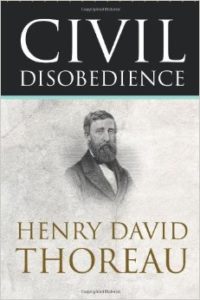Or
Civil Disobedience is an attempt to reconfigure the relationship between the individual and the state. Do you agree? Give reasons.
Or
What should an ideal state be like, according to Thoreau?
Or
What should be the basis of an ideal democracy, according to Thoreau?
 Answer: H.D. Thoreau in Civil Disobedience, says, “There will never be really a free and enlightened state until the state comes to recognize the individual as a higher and independent power, from which all its own power, and authority are derived, and treats him accordingly.”
Answer: H.D. Thoreau in Civil Disobedience, says, “There will never be really a free and enlightened state until the state comes to recognize the individual as a higher and independent power, from which all its own power, and authority are derived, and treats him accordingly.”
The author upholds the cause of individual freedom as the basis of an ideal state which will be a really free and enlightened one. In order that such. a state may grow, it should recognize the individual as higher and independent power. Talking about the contemporary state of America, the author points out that the authority of the government is an impure one, because it is not based on the recognition and actualization of individual freedom. If a government wants to be strictly just is must have the sanction and consent of the governed. It cannot have any pure right over the person and property of an individual, except that he concedes to it. The progress from an obsolete to a limited monarchy from a limited monarchy to a democracy is a progress towards a true respect for the individual. The Chinese philosopher Confucius was wise enough to regard the individual as the basis of the empire. Every citizen or every nation, should question itself whether it is not possible to effect the last improvement of a democratic government by recognizing and individual freedom. They should question themselves further whether it is not possible to take a step farther towards recognizing and organizing the rights of a man. The writer remains pleased to imagine at least a State which can afford to be just too all men, and to treat the individual with respect as a neighbor.
[adToAppearHere]
The author has assigned greatest importance to the fact that in order to build an ideal democratic state, we should allow maximum freedom to its individual citizens. Such a state would not think it consistent with its own repose if a few citizens were to live aloof from it, not meddling with it, nor embraced by it that fulfilled all the duties of neighbors and fellowmen. The state should be so democratic as to encourage people to point out faults of the state. It means that, according to Thoreau, democracy is not a one-sided affair—an affair in which the state does everything autocratically. Democracy is rather an affair in which both the state and the people should have equal contribution. The faults of the one should be removed by the benevolent interference of the other. If Thoreau’s suggestions were followed, the state would be one of perfect democracy, and the people would be its ideal members.
The essay sets out to reconstruct the relationship between the State and the individual, according to conscience, not by arbitrary rules framed by the state. The usual rule of governing a democratic state has been to rule by the opinion of the majority. But Thoreau says if the rules are immoral or fail to grant personal freedom, the rules should rather be violated, by peaceful means. Worthy people should come to rule the democratic state, and conscience should be the basis for the rules of the state. If the government of state is guided by conscience, and if each individual is also saturated with conscience, the state need not govern at all, for things will automatically run on their own.
To Thoreau, that government is best which governs least. He justifies his opinion by saying that in a democratic state, every individual is a free individual, having the right to do whatever he likes, unless he interferes with others’ affairs. He is guided by conscience, so that his freedom will not mean anarchy or oppressive arbitrary acts. Such an individual can do things for the welfare of the state, or the nation as a whole. If every individual citizen of a state is thus governed by conscience, the government of the state will have no need to govern the people.
[adToAppearHere]
The perfect type of government should be one in which people would be able to enjoy their absolute freedom without any interference on the part of the government. Rather the government should be an organ through which each individual will get his hopes and aspirations realized. Such a government will act on behalf of each individual in the State. Each individual’s words and deeds would be expressed through such a government.
The government is an expedient, but an ideal form of government should be an expedient to a maximum; it should allow individuals to have maximum freedom, freedom of will and freedom of action. It should interfere least with the thoughts and actions of an individual. The author wants to speak practically and as a citizen, there should be at once better governments than what exists at present. That government should be the most expedient, and will refrain from interference with any individual.




